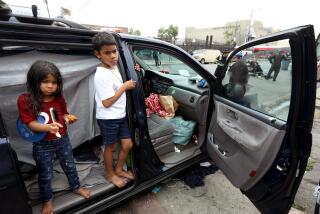From Getty to Gritty
- Share via
Halfway through a three-month visit to this country, they’ve received the red carpet treatment at some of Los Angeles’ largest companies and socialized in the Palos Verdes, Beverly Hills and Tarzana homes of some of the city’s most successful business executives.
But on Thursday, the two dozen Chinese industrial managers here for an unusual manufacturing leadership conference got the gritty sidewalk treatment on skid row.
They visited a detoxification center that caters to winos and drug addicts, dined on sandwiches served to street people, inspected the sleeping quarters of one of the city’s oldest homeless shelters and toured a rehabilitation site that assists disabled Asian Americans.
Thursday’s visit, like others arranged for the young Chinese managers during their stay, was organized by an unlikely group: retired American business executives.
The 17-year-old Executive Services Corps, whose members assist nonprofit agencies in the Los Angeles region by loaning themselves out as management experts, is helping run the 12-week Chinese leadership session, which continues at USC through Aug. 14.
The Chiang Manufacturing Leadership Program is underwritten by Hong Kong industrialist Chiang Chen, a multimillionaire who made his fortune manufacturing plastic molding machines. His daughter, Lily, is a USC graduate.
Most of the program consists of seminars and lectures on such topics as global manufacturing trends, breakthrough thinking, engineering economics, strategic management of technology and quality management. Its purpose is to help modernize Chinese industry.
But field trips arranged and led by the Executive Services Corps to places such as the Boeing plant in Downey, the Jet Propulsion Lab in Pasadena, Unocal and Xerox in El Segundo and the Getty Center in Brentwood bring the program to life.
Between trips, the visiting Chinese--who come from both mainland China and Taiwan--are dinner guests at the upscale homes of the Corps’ retired business leaders.
That made Thursday’s skid row trip an eye-opening adventure for the visitors.
“It is not common to see people sleeping in the streets in my country,” said Lu Wei, the 35-year-old manager of a Chinese automobile brake factory, as he studied a row of homeless people camped out in the shade along a 5th Street sidewalk opposite the Salvation Army’s Harbor Light shelter.
“We’re seeing a different situation,” said Yan Meng, 31, the assistant president of an airport equipment company. “This is a good chance to enlarge our vision.”
Barrie Segall, an Executive Service Corps leader who accompanied the visitors first to the Harbor Light shelter and then a few blocks away to the Asian Rehabilitation Services Center on East Washington Boulevard, said the visit fits into Chiang’s concept of a modernized China.
“It was made very clear to us that this isn’t just about corporate issues, but about qualify of life issues as well,” Segall said of the manufacturing leadership program. “Taking care of others is a major issue, especially with a country moving from socialism to entrepreneurial capitalism.
“They are going to have unemployed people. Homelessness.”
Yongjian Bao, assistant director of USC’s Asia Pacific Institute, said field trips to Los Angeles-area manufacturing plants have fleshed out the classroom instruction the Chinese received.
But the skid row outing showed that “the strength of a society can be reflected from the other side of society, where a community shows a feeling of sharing,” he said.
And the use of retirees to help teach the Chinese and introduce them to American counterparts also fits in with Chiang’s view, Bao said.
“Dr. Chiang wants them to go back to their cities in China and mentor, too. He’s looking at the multiplying factor. He sees them as leaders in their own communities.”
The leadership conference purposefully mixed industrial managers from mainland China (which sent 19) with those from Taiwan (which sent five).
“He has an intention to bridge the two countries together,” Bao said.
Industrial managers from Taiwan were impressed by the volunteers at the Salvation Army shelter and work being done at the Asian Rehabilitation Services center. There, 100 mentally ill and developmentally disabled people--about 30% of whom are of Asian descent--are daily taught job skills such as bagging and sorting.
The Taiwanese were surprised by recent economic changes in this country.
“The U.S. has come back as a very productive country in the last 10 years,” said Terry Chang, 41, vice president of a Taiwan machinery company.
Countryman C.Y. Lin, a 43-year-old computer parts plant manager, added: “You have a good economic situation now. People feel comfortable again.”
More to Read
Inside the business of entertainment
The Wide Shot brings you news, analysis and insights on everything from streaming wars to production — and what it all means for the future.
You may occasionally receive promotional content from the Los Angeles Times.











